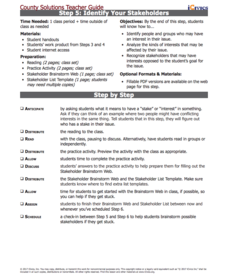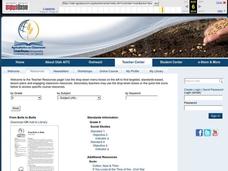National Endowment for the Humanities
Hopi Place Names
What's in a name? Historians consider the question as they examine places important to the Hopi people and the meanings of their place names. Included worksheets include maps and charts to help class members examine the geography of Hopi...
Curated OER
Gettysburg Readdressed
Students engage in a lesson that is concerned with the creation of The Gettysburg Address set within a modern context. They read the entire speech and then brainstorm to create modern ideas that are similar. Students compose a modern...
State Bar of Texas
Wisconsin v. Yoder
How far does freedom of religion truly go? The 1972 Supreme Court case Wisconsin v. Yoder introduces the concept of the free exercise clause of the First Amendment. Individuals examine the case with a short video and open discussion. To...
National Endowment for the Humanities
African-American Communities in the North Before the Civil War
Middle schoolers may be surprised to learn that before the American Civil War there were more slaves living in New York than there were in Kentucky! Young historians examine maps and census data to gather statistics about...
Judicial Learning Center
About Federal Judges: Qualifications of Judges
"Help Wanted: A Supreme Court Justice." What should be included in the ad? Learners ponder the question during a lively activity that asks them to examine the qualifications for various federal offices and then create job postings....
Judicial Learning Center
Article III WebQuest
Why is Article III of the constitution so significant? Pupils discover the importance of Article III and how it relates to past as well as current events by completing Internet research using a provided handout. They learn everything...
Judicial Learning Center
Rule of Law WebQuest
Go on a WebQuest to find the Rule of Law! Scholars use the Internet to learn all about how law works in a democracy and how the Rule of Law relates to both American government and governments around the world. Researchers then engage in...
American Battlefield Trust
Emancipation 1861 to 1863
Academics read newspaper articles from 1861 to 1863 regarding Emancipation and answer questions to understand how public opinion changed over time and why. The activity provides scholars with good historical context and the vocabulary...
National Endowment for the Humanities
“From Time to Time”: Presidents and Communicating with the Public
While the Constitution requires a "State of the Union" address, it doesn't give many details. In fact, it wasn't until Woodrow Wilson that the periodic update to Congress was given in-person. Using primary sources, recordings and...
Miama-Dade County Public Schools
Patriot Day September 11, 2011
While many of our learners may recognize the date of September 11, 2001 in the United States, most will not be able to personally recall what transpired. On Patriot Day, introduce your young learners to the events, aftermath, and...
National Wildlife Federation
Yesterday: Our Energy Needs Over Time
How has our relationship to energy changed over time? An engaging exploration challenges learners to create a timeline showing human energy needs and uses over time. Scholars review what timelines are, choose a 50-year period in history...
iCivics
Step 5: Identify Your Stakeholders
Have you ever had a goal, but needed help achieving it? Scholars analyze the purpose of stakeholders in the fifth installment of a 10-part County Solutions - High School series. They investigate finances, personal concerns, geography,...
PBS
Eleanor Roosevelt: First Lady, Diplomat, and Activist
Scholars analyze the impact Eleanor Roosevelt had on not just the nation, but also on the world. Primary sources and video clips help form a picture of the First Lady and her accomplishments. As a final activity, individuals create...
iCivics
Mini-Lesson: Midterm Elections
Find out the differences between presidential and midterm elections with an informative resource. Pupils discuss the importance of midterms to the presidency and how midterms affect the balance of government branches. They also fill out...
Curated OER
That Was Then, This Is Now
Fifth graders examine the world power of the United States. In this Social Studies lesson, 5th graders choose a world issue and identify ways the United States could help to solve the situation. Students determine the consequences and...
Curated OER
From Bolls to Bolts
Fifth graders explore the economic effects of the colonization of North America. In this Social Studies lesson, 5th graders examine the economic and cultural results that occurred due to North America entering the market. Students...

















